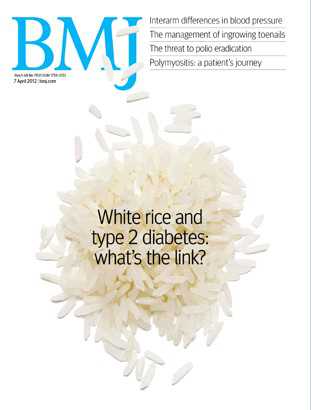BMJ:抗生素可免去单纯性阑尾炎患者的手术之苦
2012-04-12 EurekAlert! EurekAlert!
近日,诺丁汉大学专家们在最新发表于国际著名杂志BMJ上的论文中指出,让单纯性急性阑尾炎患者服用抗生素是一种可取代手术的既安全又可行的方法。 自1989年以来,通过手术摘除发炎的阑尾一直是治疗阑尾炎的最被认可的方法。常见的说法是,如果不做手术的话,发生并发症如穿孔或感染的风险会很高。然而,近期的研究表明使用抗生素治疗比采用手术治疗单纯性阑尾炎的效果更好。但一直没有定论。 因此,诺丁汉大学消化道疾
近日,诺丁汉大学专家们在最新发表于国际著名杂志BMJ上的论文中指出,让单纯性急性阑尾炎患者服用抗生素是一种可取代手术的既安全又可行的方法。
自1989年以来,通过手术摘除发炎的阑尾一直是治疗阑尾炎的最被认可的方法。常见的说法是,如果不做手术的话,发生并发症如穿孔或感染的风险会很高。然而,近期的研究表明使用抗生素治疗比采用手术治疗单纯性阑尾炎的效果更好。但一直没有定论。
因此,诺丁汉大学消化道疾病研究中心(NIHR)生物医学研究组的科学家们对抗生素进行早期治疗的安全性和效果进行对比研究。诺丁汉大学肠胃外科Dileep Lobo教授和诺丁汉皇后医疗中心顾问都是此研究的带头人。其他共同署名作者包括Krishna Varadhan博士和Keith Neal教授。
减少并发症风险
科学家们分析了随机抽样的900名成人患者的实验结果。一共有470名患者接受了抗生素治疗;另外430名患者接受了手术。实验设计与质量等因素都被考虑在内以尽量减少实验偏差。
在一年当中,抗生素治疗的成功率是63%。与手术治疗相比,抗生素使并发症的发生减少了31%。即使是除开从抗生素治疗转到手术治疗的患者,抗生素治疗在并发症方面有显著的降低(39%)。因症状复发再次入院的68例抗生素治疗患者中,其中4名的阑尾为正常,13名有并发症。另外3名患者因另一种剂量的抗生素而治疗成功。在住院时间和发生并发症的风险方面,两种治疗方法并无明显不同。
“等待,观察和治疗”
论文的作者们称抗生素在治疗急性阑尾炎的作用在过去因传统印象而遭到忽视。新的观念应该是“等待,观察和治疗”。然而,对有穿孔和腹膜炎的患者而言,早期的阑尾切除仍然非常重要。
研究者们总结称抗生素治疗法是对单纯性急性阑尾炎的一种安全的先期治疗方法。这种方法可使65%的患者避免阑尾切除。

doi:10.1136/bmj.e2156
Safety and efficacy of antibiotics compared with appendicectomy for treatment of uncomplicated acute appendicitis: meta-analysis of randomised controlled trials
Krishna K Varadhan, research fellow1, Keith R Neal, professor12, Dileep N Lobo, professor1
Objective To compare the safety and efficacy of antibiotic treatment versus appendicectomy for the primary treatment of uncomplicated acute appendicitis. Design Meta-analysis of randomised controlled trials. Population Randomised controlled trials of adult patients presenting with uncomplicated acute appendicitis, diagnosed by haematological and radiological investigations. Interventions Antibiotic treatment versus appendicectomy. Outcome measures The primary outcome measure was complications. The secondary outcome measures were efficacy of treatment, length of stay, and incidence of complicated appendicitis and readmissions. Results Four randomised controlled trials with a total of 900 patients (470 antibiotic treatment, 430 appendicectomy) met the inclusion criteria. Antibiotic treatment was associated with a 63% (277/438) success rate at one year. Meta-analysis of complications showed a relative risk reduction of 31% for antibiotic treatment compared with appendicectomy (risk ratio (Mantel-Haenszel, fixed) 0.69 (95% confidence interval 0.54 to 0.89); I2=0%; P=0.004). A secondary analysis, excluding the study with crossover of patients between the two interventions after randomisation, showed a significant relative risk reduction of 39% for antibiotic therapy (risk ratio 0.61 (0.40 to 0.92); I2=0%; P=0.02). Of the 65 (20%) patients who had appendicectomy after readmission, nine had perforated appendicitis and four had gangrenous appendicitis. No significant differences were seen for treatment efficacy, length of stay, or risk of developing complicated appendicitis. Conclusion Antibiotics are both effective and safe as primary treatment for patients with uncomplicated acute appendicitis. Initial antibiotic treatment merits consideration as a primary treatment option for early uncomplicated appendicitis.
本网站所有内容来源注明为“williamhill asia 医学”或“MedSci原创”的文字、图片和音视频资料,版权均属于williamhill asia 医学所有。非经授权,任何媒体、网站或个人不得转载,授权转载时须注明来源为“williamhill asia 医学”。其它来源的文章系转载文章,或“williamhill asia 号”自媒体发布的文章,仅系出于传递更多信息之目的,本站仅负责审核内容合规,其内容不代表本站立场,本站不负责内容的准确性和版权。如果存在侵权、或不希望被转载的媒体或个人可与williamhill asia 联系,williamhill asia 将立即进行删除处理。
在此留言








#BMJ#
72